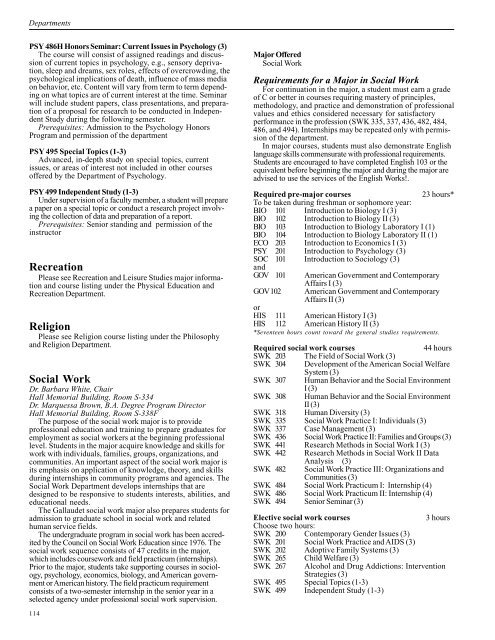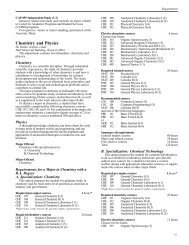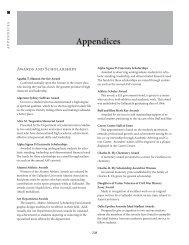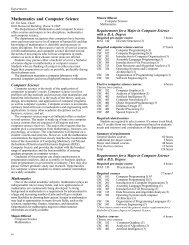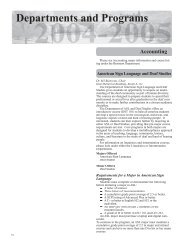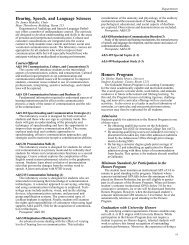Recreation Religion Social Work - Undergraduate Admissions
Recreation Religion Social Work - Undergraduate Admissions
Recreation Religion Social Work - Undergraduate Admissions
Create successful ePaper yourself
Turn your PDF publications into a flip-book with our unique Google optimized e-Paper software.
Departments<br />
PSY 486H Honors Seminar: Current Issues in Psychology (3)<br />
The course will consist of assigned readings and discussion<br />
of current topics in psychology, e.g., sensory deprivation,<br />
sleep and dreams, sex roles, effects of overcrowding, the<br />
psychological implications of death, influence of mass media<br />
on behavior, etc. Content will vary from term to term depending<br />
on what topics are of current interest at the time. Seminar<br />
will include student papers, class presentations, and preparation<br />
of a proposal for research to be conducted in Independent<br />
Study during the following semester.<br />
Prerequisites: Admission to the Psychology Honors<br />
Program and permission of the department<br />
PSY 495 Special Topics (1-3)<br />
Advanced, in-depth study on special topics, current<br />
issues, or areas of interest not included in other courses<br />
offered by the Department of Psychology.<br />
PSY 499 Independent Study (1-3)<br />
Under supervision of a faculty member, a student will prepare<br />
a paper on a special topic or conduct a research project involving<br />
the collection of data and preparation of a report.<br />
Prerequisites: Senior standing and permission of the<br />
instructor<br />
<strong>Recreation</strong><br />
Please see <strong>Recreation</strong> and Leisure Studies major information<br />
and course listing under the Physical Education and<br />
<strong>Recreation</strong> Department.<br />
<strong>Religion</strong><br />
Please see <strong>Religion</strong> course listing under the Philosophy<br />
and <strong>Religion</strong> Department.<br />
<strong>Social</strong> <strong>Work</strong><br />
Dr. Barbara White, Chair<br />
Hall Memorial Building, Room S-334<br />
Dr. Marquessa Brown, B.A. Degree Program Director<br />
Hall Memorial Building, Room S-338F<br />
The purpose of the social work major is to provide<br />
professional education and training to prepare graduates for<br />
employment as social workers at the beginning professional<br />
level. Students in the major acquire knowledge and skills for<br />
work with individuals, families, groups, organizations, and<br />
communities. An important aspect of the social work major is<br />
its emphasis on application of knowledge, theory, and skills<br />
during internships in community programs and agencies. The<br />
<strong>Social</strong> <strong>Work</strong> Department develops internships that are<br />
designed to be responsive to students interests, abilities, and<br />
educational needs.<br />
The Gallaudet social work major also prepares students for<br />
admission to graduate school in social work and related<br />
human service fields.<br />
The undergraduate program in social work has been accredited<br />
by the Council on <strong>Social</strong> <strong>Work</strong> Education since 1976. The<br />
social work sequence consists of 47 credits in the major,<br />
which includes coursework and field practicum (internships).<br />
Prior to the major, students take supporting courses in sociology,<br />
psychology, economics, biology, and American government<br />
or American history. The field practicum requirement<br />
consists of a two-semester internship in the senior year in a<br />
selected agency under professional social work supervision.<br />
114<br />
Major Offered<br />
<strong>Social</strong> <strong>Work</strong><br />
Requirements for a Major in <strong>Social</strong> <strong>Work</strong><br />
For continuation in the major, a student must earn a grade<br />
of C or better in courses requiring mastery of principles,<br />
methodology, and practice and demonstration of professional<br />
values and ethics considered necessary for satisfactory<br />
performance in the profession (SWK 335, 337, 436, 482, 484,<br />
486, and 494). Internships may be repeated only with permission<br />
of the department.<br />
In major courses, students must also demonstrate English<br />
language skills commensurate with professional requirements.<br />
Students are encouraged to have completed English 103 or the<br />
equivalent before beginning the major and during the major are<br />
advised to use the services of the English <strong>Work</strong>s!.<br />
Required pre-major courses<br />
23 hours*<br />
To be taken during freshman or sophomore year:<br />
BIO<br />
BIO<br />
101<br />
102<br />
Introduction to Biology I (3)<br />
Introduction to Biology II (3)<br />
BIO 103 Introduction to Biology Laboratory I (1)<br />
BIO 104 Introduction to Biology Laboratory II (1)<br />
ECO 203 Introduction to Economics I (3)<br />
PSY 201 Introduction to Psychology (3)<br />
SOC 101 Introduction to Sociology (3)<br />
and<br />
GOV 101 American Government and Contemporary<br />
Affairs I (3)<br />
GOV 102 American Government and Contemporary<br />
Affairs II (3)<br />
or<br />
HIS 111 American History I (3)<br />
HIS 112 American History II (3)<br />
*Seventeen hours count toward the general studies requirements.<br />
Required social work courses<br />
44 hours<br />
SWK 203 The Field of <strong>Social</strong> <strong>Work</strong> (3)<br />
SWK 304 Development of the American <strong>Social</strong> Welfare<br />
System (3)<br />
SWK 307 Human Behavior and the <strong>Social</strong> Environment<br />
I (3)<br />
SWK 308 Human Behavior and the <strong>Social</strong> Environment<br />
II (3)<br />
SWK 318 Human Diversity (3)<br />
SWK 335 <strong>Social</strong> <strong>Work</strong> Practice I: Individuals (3)<br />
SWK 337 Case Management (3)<br />
SWK 436 <strong>Social</strong> <strong>Work</strong> Practice II: Families and Groups (3)<br />
SWK 441 Research Methods in <strong>Social</strong> <strong>Work</strong> I (3)<br />
SWK 442 Research Methods in <strong>Social</strong> <strong>Work</strong> II Data<br />
SWK 482<br />
Analysis (3)<br />
<strong>Social</strong> <strong>Work</strong> Practice III: Organizations and<br />
Communities (3)<br />
SWK 484 <strong>Social</strong> <strong>Work</strong> Practicum I: Internship (4)<br />
SWK 486<br />
SWK 494<br />
<strong>Social</strong> <strong>Work</strong> Practicum II: Internship (4)<br />
Senior Seminar (3)<br />
Elective social work courses<br />
3 hours<br />
Choose two hours:<br />
SWK 200 Contemporary Gender Issues (3)<br />
SWK 201 <strong>Social</strong> <strong>Work</strong> Practice and AIDS (3)<br />
SWK 202 Adoptive Family Systems (3)<br />
SWK 265 Child Welfare (3)<br />
SWK 267 Alcohol and Drug Addictions: Intervention<br />
Strategies (3)<br />
SWK 495 Special Topics (1-3)<br />
SWK 499 Independent Study (1-3)
Departments<br />
Summary of requirements<br />
General studies courses 60 hours<br />
Additional pre-major courses 6 hours<br />
Major courses 47 hours<br />
Free elective courses 11 hours<br />
Total 124 hours<br />
Courses Offered<br />
SWK 200 Contemporary Gender Issues (3)<br />
This course is an elective that examines topics related to<br />
gender discrimination, and the traditional as well as the nontraditional<br />
roles assigned to females and males. Differences in<br />
communication patterns among women and men are also<br />
examined in terms of their expressions of emotions, closeness,<br />
intimacy, and autonomy. The course provides an<br />
opportunity for students to critically evaluate evidence for<br />
and against society’s long held beliefs about acceptable<br />
behaviors and choices based on gender. More specifically,<br />
the variations in gender roles among Asian-American,<br />
Hispanic, Native American and African-American women and<br />
men are examined. A variety of writing assignments are<br />
included. Students complete weekly summaries of readings,<br />
critically evaluate contrasting perspectives on gender issues,<br />
and make presentations using handouts and overhead to<br />
convey their ideas about differences in values, copying<br />
styles and communication patterns among females and males.<br />
Prerequisite: Sophomore standing<br />
SWK 201 <strong>Social</strong> <strong>Work</strong> Practice and AIDS (3)<br />
This course is an elective that examines topics related to<br />
understanding the psychosocial issues associated with HIV/<br />
AIDS and the various roles human service professionals<br />
assume for the delivery of services. The course provides an<br />
opportunity for students to explore personal and societal<br />
values related to HIV/AIDS and to gain a beginning knowledge<br />
of the types of assistance available to persons living<br />
with the illness. Particular attention is given to the impact of<br />
HIV/AIDS upon families and care givers in the context of<br />
coping strategies and the human service delivery system’s<br />
response to their needs.<br />
Prerequisite: Sophomore standing<br />
SWK 202 Adoptive Family Systems (3)<br />
The course explores the strengths and challenges of<br />
adoptive family life from a systems perspective and introduces<br />
current theory and research that informs social work<br />
practice in the field of adoption. The course addresses from<br />
a developmental perspective the life long impact of adoption<br />
on the adoption triad: birth parents, adoptive parents, and<br />
adopted children. Topics discussed include emotional<br />
processes involved with infertility and the decision to adopt,<br />
adoption and developmental stages, issues related to open<br />
adoption, and transracial adoptions.<br />
Prerequisite: Sophomore standing<br />
SWK 203 The Field of <strong>Social</strong> <strong>Work</strong> (3)<br />
This course is an introduction to the profession of social<br />
work. It is the required first course for social work majors and<br />
is also open to students exploring the field of social work as a<br />
possible career. The course traces the historical development<br />
of the social work profession within the context of the social<br />
welfare system, introduces the generalist model of social<br />
work practice, surveys the major field of practice and populations<br />
served by social workers, and addresses the role of<br />
evaluation and research in the profession. Guest speakers<br />
from the community and field trips to community agencies<br />
provide exposure to programs and services and the roles of<br />
social workers.<br />
Prerequisite: Sophomore standing<br />
SWK 265 Child Welfare (3)<br />
This course introduces the student to the fields of child<br />
welfare with an emphasis on child maltreatment. It looks at<br />
child abuse and neglect in all its forms (physical, sexual,<br />
emotional) in an ecological context (individual, familial, social,<br />
and cultural forces that interact with one another to cause<br />
abuse). Students are introduced to the historical context of<br />
child maltreatment, the current social policies that are in place<br />
that affect the protection of children, and the role of the<br />
social worker in child protection. Also covered are the<br />
procedures for child abuse investigation and reporting,<br />
interviewing the child and family, and the role of the court<br />
system. Controversial issues and opposing viewpoints are<br />
considered such as imprisonment of abusers, effectiveness<br />
of prevention programs, foster care, and proposed policy<br />
changes designed to reduce violence and harm to children.<br />
Prerequisite: Sophomore standing<br />
SWK 267 Alcohol and Drug Addictions: Intervention<br />
Strategies (3)<br />
This course prepares the student in one of the helping<br />
professions to understand the primary issues related to the<br />
use and abuse of alcohol and other drugs, including narcotics,<br />
depressants, stimulants, hallucinogens, and marijuana.<br />
The impact of drug use on the individual, the family, and<br />
society will be examined, including the psychological<br />
ramifications of children of alcoholics and drug abusers.<br />
Emphasis will be on the development of intervention skills<br />
and identifying the person who is abusing chemicals.<br />
Knowledge of community resources and programs, with<br />
attention given to accessibility to deaf substance abusers,<br />
will be covered.<br />
SWK 304 Development of the American <strong>Social</strong> Welfare<br />
System (3)<br />
This course explores the history and values of the social<br />
work profession in relation to the development of the social<br />
welfare system as well as traditional American values involved<br />
in the evolution of the current system. It also considers various<br />
conceptions of social welfare, their application in social welfare<br />
programs, and their implications in practice. Issues and policies<br />
that affect diverse populations who have experienced oppression<br />
and discrimination are examined.<br />
Prerequisite: SWK 203<br />
Prerequisites/corequisites: ECO 203; GOV 101, 102 or HIS<br />
111, 112<br />
SWK 307 Human Behavior and the <strong>Social</strong> Environment I (3)<br />
The course examines human behavior from conception<br />
through very old age. Throughout the course, the physical,<br />
intellectual, social, an emotional growth of individuals and<br />
families (micro systems) are studied. Each aspect of development<br />
is examined in the context of the environment’s influence<br />
upon optimal growth. Additionally, attention is given to<br />
the interplay among culture, socioeconomic status, and<br />
ethnicity upon human behavior through the life course.<br />
Prerequisite: Junior standing or permission of the<br />
department<br />
SWK 308 Human Behavior and the <strong>Social</strong> Environment II (3)<br />
The course explores human behavior in communities,<br />
organizations and groups (macro systems). An overarching<br />
ecosystems perspective is emphasized for understanding<br />
how each macro system can enhance people’s optimal health<br />
and well-being. Aspects of diversity are incorporated<br />
throughout the course in the form of issues that affect human<br />
behavior. Throughout the course, content about the macro<br />
social environment is directly related to generalist social work<br />
practice using case material.<br />
115
Departments<br />
Prerequisites: SWK 307; Junior standing or permission of<br />
the department<br />
SWK 318 Human Diversity (3)<br />
This course provides students an opportunity for examination<br />
of personal attitudes, stereotypes, biases, and misconceptions<br />
that affect ethnic-competent professional practice. Attention is<br />
given to increasing students’ knowledge, understanding,<br />
appreciation, and sensitivity to diversity, oppression, and<br />
racism, and the implications of each for social work and other<br />
human services. While the course addresses the cognitive<br />
and conceptual aspects of learning, primary emphasis is on<br />
the affective process. In addition to learning about racism,<br />
discrimination, power/powerlessness, and ethnocentrism,<br />
students participate in experiential groups and role play. These<br />
exercises provide opportunities to explore new ways of<br />
thinking, feeling, and responding to people who experience<br />
discrimination or oppression because of their race, ethnic<br />
background, gender, age, disability, or sexual orientation, or<br />
because they are deaf or hard of hearing.<br />
Prerequisite: Junior standing<br />
SWK 335 <strong>Social</strong> <strong>Work</strong> Practice I: Individuals (3)<br />
This is the first course in the social work practice sequence<br />
and emphasizes the generalist model as the framework<br />
for all social work practice using a problem-solving<br />
approach. A major focus of the course is on the development<br />
of skills for practice with individuals within the context of<br />
social work values and ethics. Cross-cultural considerations<br />
and other differences between social worker and client are<br />
addressed throughout the semester. The course includes a<br />
weekly lab that provides opportunities for learning interviewing<br />
skills through the use of videotapes and role play.<br />
Prerequisites/corequisities: SWK 203, 307; open to social<br />
work majors only<br />
SWK 337 Case Management (3)<br />
Case Management is a required course in the practice<br />
sequence. It introduces students to case management and<br />
the various methods of intervention used with the process.<br />
Among the case management and the various methods of<br />
intervention used with the process. Among the case management<br />
processes discussed are assessment, intake<br />
interviews, and documentation. Specialized practice skills<br />
used by case managers are also discussed. Students are<br />
taught methods for determining benefit eligibility, learn the<br />
rules and principles for referral making, and acquire knowledge<br />
related to the major income and maintenance and<br />
support programs. Ethical and legal issues surrounding case<br />
management in the context of client autonomy, informed<br />
consent, and confidentiality are discussed and applied to<br />
case material. The course includes a pre-field experience that<br />
requires weekly visits to a human services organization for<br />
the purpose of observing the case management process.<br />
Prerequisites: Grade of C or better in SWK 203, 307, 335;<br />
open to social work majors only<br />
SWK 436 <strong>Social</strong> <strong>Work</strong> Practice II: Families and Groups (3)<br />
This course focuses on the development of knowledge<br />
and skills for social work practice with families and groups.<br />
Particular attention is given to families in which one or more<br />
members is deaf or hard of hearing, to other minority families,<br />
and to practice issues with groups of deaf people and groups<br />
of other minority people.<br />
Prerequisite: Grade of C or better in SWK 335, 337<br />
Corequisite: SWK 484<br />
SWK 441 Research Methods in <strong>Social</strong> <strong>Work</strong> I (3)<br />
The focus of this course is on the development of knowledge<br />
and skills for systematically monitoring and evaluating social<br />
work practice. The course covers quantitative and qualitative<br />
methods, ethical issues in research, special considerations in<br />
cross-cultural research, the value of single subject designs for<br />
evaluation of practice, critical analysis of research studies, and<br />
use of research findings in professional practice.<br />
Prerequisite: SWK 335<br />
SWK 442 Research Methods In <strong>Social</strong> <strong>Work</strong> II Data<br />
Analysis (3)<br />
This course focuses on statistical and qualitative methods<br />
of data analysis that provide tools for social workers to<br />
evaluate their own practice and programs. Included are<br />
descriptive statistics, inferential statistics, content analysis<br />
of case studies, and inductive analysis of informant interviews<br />
and focus groups. The course also introduces students<br />
to the use of the computer in data analysis and<br />
provides hands-on experience with the Statistical Package for<br />
the <strong>Social</strong> Sciences and with the Ethnograph software<br />
package for qualitative data analysis.<br />
Prerequisite: SWK 441<br />
SWK 482 <strong>Social</strong> <strong>Work</strong> Practice III: Organizations and<br />
Communities (3)<br />
This course focuses on the development of skills for<br />
planned change in organizations and communities. The<br />
problem-solving process learned in previous social work<br />
practice courses is applied to problem analysis, goal formulation,<br />
and implementation of change within organizations and<br />
communities. Field practicum agencies, human service<br />
organizations, and other programs and services in the<br />
community are assessed, needs and problems are identified,<br />
and strategies for planned change are developed. Specific<br />
attention is given to strategies for change that will benefit<br />
traditionally underserved populations such as deaf and hard<br />
of hearing people, racial and ethnic minorities, women, people<br />
with disabilities, gays and lesbians, and older people.<br />
Prerequisite: Grade of C or better in SWK 436<br />
SWK 484 <strong>Social</strong> <strong>Work</strong> Practicum I: Internship (4)<br />
This course is part of a sequence with SWK 486. During<br />
the course, students spend two full days (16 hours) per week<br />
within a practicum agency carefully selected to provide<br />
educationally sound experiences supervised by professional<br />
social workers. During the internship, students develop skills<br />
working with individuals, families, groups, organizations, and<br />
communities. Students have approximately 250 hours of<br />
practicum during this semester.<br />
Prerequisite: Grade of C or better in SWK 335, 337<br />
Corequisites: SWK 436 and permission of the department<br />
SWK 486 <strong>Social</strong> <strong>Work</strong> Practicum II: Internship (4)<br />
During the second semester, students remain in the same<br />
practicum agency to ensure that there is sufficient time to<br />
develop plans and implement interventions at all levels in the<br />
attainment of skills for generalist social work practice. There<br />
are again approximately 250 hours of internship.<br />
Prerequisite: SWK 484; grade of C or better in SWK 436<br />
SWK 494 Senior Seminar (3)<br />
This course taken in the final semester of the major<br />
focuses on furthering the process of integrating social work<br />
knowledge, values, and skills. Students draw upon and apply<br />
knowledge of generalist social work practice and the specific<br />
knowledge, values, and skills required for work with individuals,<br />
families, groups, organizations, and communities. The<br />
objective of this course is to enhance the students ability to<br />
practice social work in the internship and to be prepared as<br />
beginning professional level generalist social workers upon<br />
116
Departments<br />
completion of the program.<br />
Prerequisites: Grade of C or better in SWK 436 and 484<br />
Corequisite: SWK 486<br />
SWK 495 Special Topics (1-3)<br />
Special topics in the field of social work.<br />
SWK 499 Independent Study (1-3)<br />
Prerequisite: Independent study form, permission of the<br />
department<br />
Sociology<br />
Dr. Sharon Barnartt, Chair<br />
Hall Memorial Building, Room S-133<br />
The Department of Sociology provides a variety of<br />
courses to meet the needs of students majoring in sociology<br />
as well as students seeking to satisfy their general studies<br />
requirements. Sociology is an important part of a liberal arts<br />
education, and students interested in elective courses to<br />
complete their degree requirements will find many upperdivision<br />
sociology courses that complement courses offered<br />
in other departments.<br />
Sociology is a social science that is concerned primarily<br />
with studying social behavior and human groups. Among<br />
other things, sociology looks at how groups influence<br />
individual behavior, how groups cooperate or conflict with<br />
one another, and how societies are established and change.<br />
Sociologists are also concerned with social problems that<br />
occur in societies such as crime, racial and sexual discrimination,<br />
poverty, and inadequate health care. Sociology emphasizes<br />
how various forms of social organization (rather than<br />
bad people ) contribute to problems such as these.<br />
The department offers a general major in sociology as well<br />
as a major in sociology with a concentration in criminology.<br />
Minors are available in sociology and criminology. A major in<br />
sociology provides a basis for graduate study in sociology,<br />
law, criminology, and related fields. <strong>Undergraduate</strong> training in<br />
sociology is also valuable for students interested in social<br />
work, secondary school teaching, business careers, and<br />
careers in public service.<br />
Majors Offered<br />
Sociology<br />
Sociology with a concentration in Criminology<br />
Minors Offered<br />
Criminology<br />
Sociology<br />
Requirements for a Major in Sociology<br />
Students planning to major in sociology must have a<br />
grade of C or better in SOC 101.<br />
Required pre-major course<br />
3 hours*<br />
SOC 101 Introduction to Sociology (3)<br />
*Three hours count toward the general studies requirements.<br />
Required sociology courses<br />
12 hours<br />
SOC 334 Introduction to Methods of <strong>Social</strong> Research (3)<br />
SOC 375 Statistics I (3)<br />
SOC 423 <strong>Social</strong> Theory (3)<br />
SOC 407 <strong>Social</strong> Problems (3)<br />
Elective courses<br />
15 hours<br />
Choose five courses:<br />
SOC 210 The Sociology of Death and Dying (3)<br />
SOC 211 Race and Ethnic Relations (3)<br />
SOC 225 Sociology of Deafness and Deaf People (3)<br />
SOC 243 Sociology of Deviance (3)<br />
SOC 250 Introduction to the Criminal Justice System (3)<br />
SOC 251 Juvenile Delinquency (3)<br />
SOC 268 Cultural Anthropology (3)<br />
SOC 313 The Sociology of Occupations (3)<br />
SOC 318 Medical Sociology (3)<br />
SOC 376 Statistics II (3)<br />
SOC 405 Criminology (3)<br />
SOC 436 <strong>Social</strong> Inequality: Race, Class, and Gender (3)<br />
SOC 493 Senior Seminar (3)<br />
SOC 495 Special Topics (1-3)<br />
SOC 499 Independent Study (1-3)<br />
DST 305 Deaf Culture (3)<br />
DST 494 Senior Seminar (3)<br />
or other courses, perhaps from the consortium, selected in<br />
consultation with the student’s advisor.<br />
Required related course<br />
CAP 320 Field Experience (3)<br />
3 hours<br />
Summary of requirements<br />
General studies courses<br />
Major and related courses<br />
60 hours<br />
30 hours<br />
Free elective courses 34 hours<br />
Total 124 hours<br />
Requirements for a Major in Sociology with a<br />
Concentration in Criminology<br />
Students planning to major in sociology with a concentration<br />
in criminology must have a grade of C or better in SOC<br />
101.<br />
Required pre-major course<br />
3 hours*<br />
SOC 101 Introduction to Sociology (3)<br />
*Three hours count toward the general studies requirements.<br />
Required sociology courses<br />
21 hours<br />
SOC 407 <strong>Social</strong> Problems (3)<br />
SOC 250 Introduction to the Criminal Justice System (3)<br />
SOC 334 Introduction to Methods of <strong>Social</strong> Research (3)<br />
SOC 243 Sociology of Deviance (3)<br />
SOC 251 Juvenile Delinquency (3)<br />
SOC 375 Statistics I (3)<br />
SOC 405 Criminology (3)<br />
Required related course 3 hours<br />
CAP 320 Field Experience (3)<br />
Elective courses 6 hours<br />
Choose two courses, one of which must be specifically<br />
related to the field of criminology:<br />
SOC 150 Saloshin Justice Seminar (3)<br />
GOV 350 Constitutional Law (3)<br />
PHI 359 Philosophy of Punishment: Moral and Legal<br />
Aspects (3)<br />
Or other courses, perhaps from the consortium, selected in<br />
consultation with the criminology program advisor.<br />
Summary of requirements<br />
General studies courses 60 hours<br />
Major and related courses 30 hours<br />
Free elective courses 34 hours<br />
Total 124 hours<br />
117


